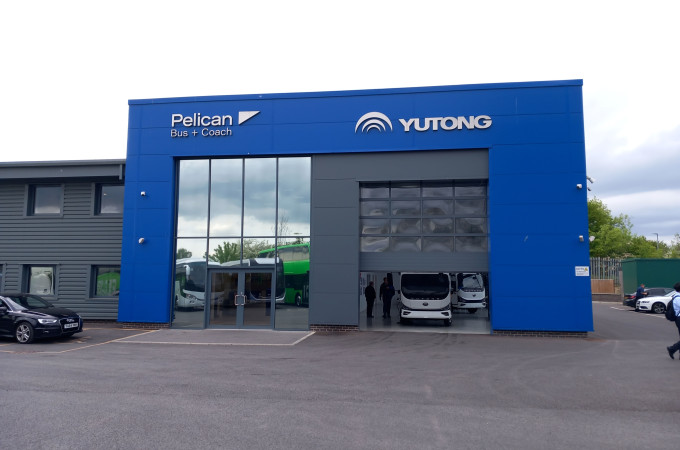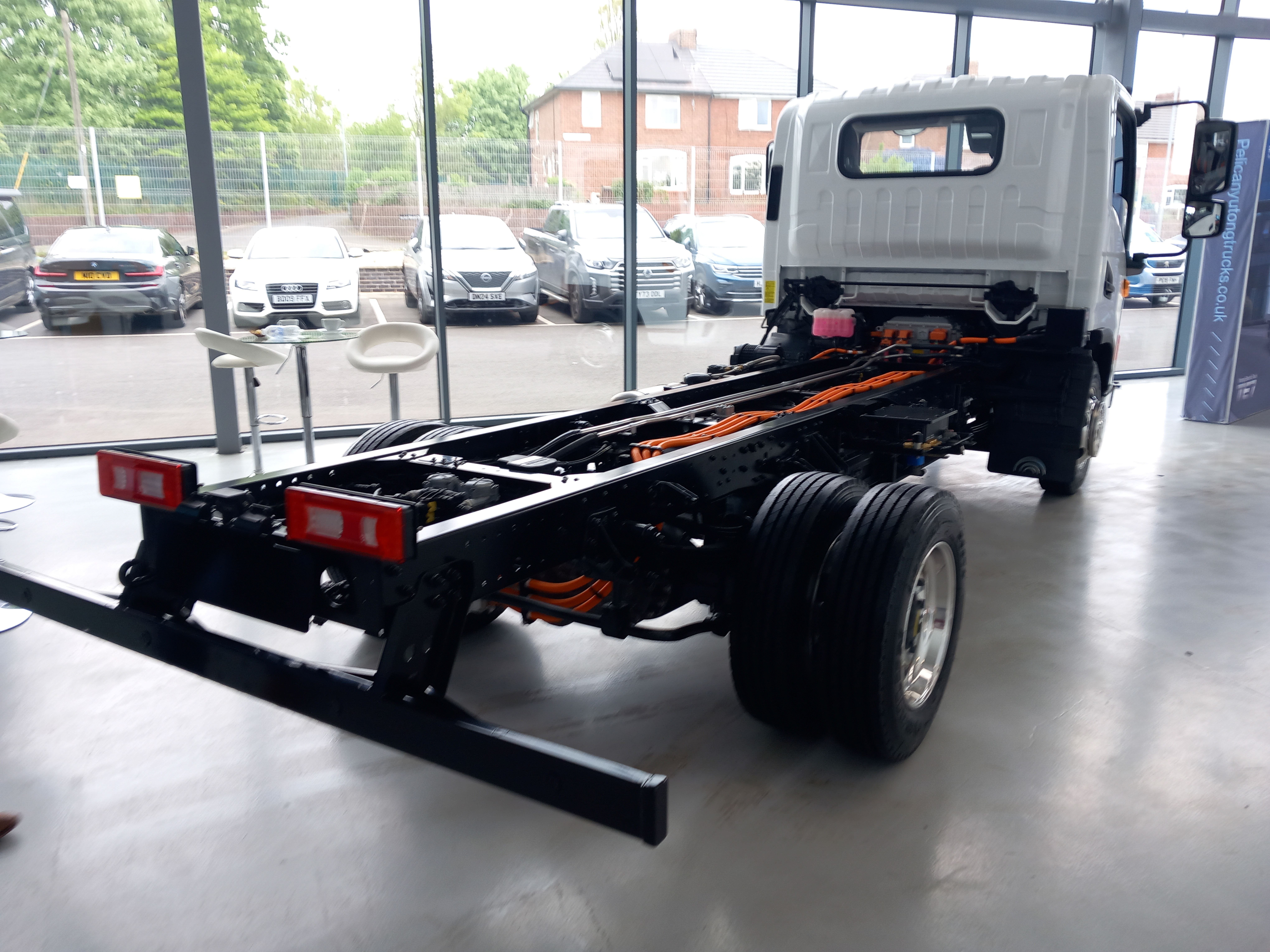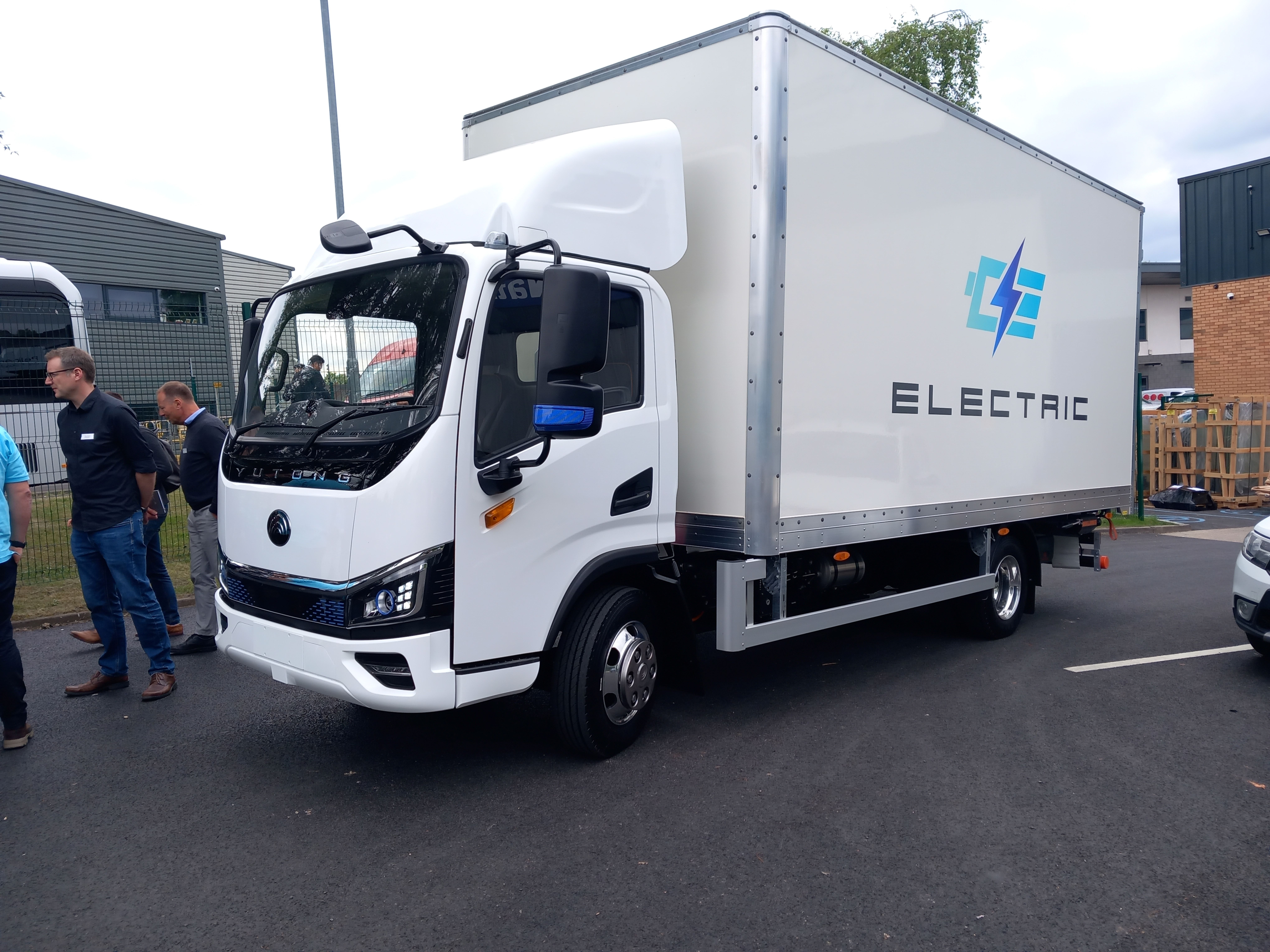Bursting at the seams: T&BB report on Yutong’s electric truck and Pelican’s operations in Castleford
By Bradley Osborne - 22nd July 2025

Pelican Bus & Coach showroom in Castleford, England
UK / China – Last year, Britain was the largest market for electric buses in Europe, a position that it owes in large part to a small company in the Yorkshire town of Castleford. In 2013, Pelican Engineering Co Ltd was appointed as the official UK and Ireland importer for Chinese manufacturer Zhengzhou Yutong Group Co Ltd and began selling its buses and coaches; in 2020, the first battery electric Yutong vehicles were deployed in Britain. In the last decade, 2,000 Yutong vehicles were sold through Pelican, of which over 800 are fully electric. For those familiar with Pelican solely as an importer of buses and coaches, the company’s announcement that it would introduce a medium-duty truck may have come as a surprise. In fact, as I learned on a recent trip to the company’s premises in the north of England, the decision to enter the electric truck market represents a return to Pelican’s roots as the oldest family-owned truck dealership still in operation in Britain.
In Castleford, I saw a business operation which is bursting at the seams to meet growing demand for Yutong’s electric vehicles. A new showroom, used on the day to display the electric truck, sits next to a large workshop where buses and coaches from China are modified and inspected before being delivered to customers. Around 750 vehicles go through the workshop every year. At a separate location, Pelican’s former showroom is now used for training and for installing wheelchair lifts and other fittings on the Yutong vehicles; and at yet another location, Pelican has its national parts distribution centre, serving not only the bus and coach operations but also its network of DAF and MAN dealerships. During the visit, I was told that employee training would be moved to a new location after construction is finished on a fresh plot of land.
It was difficult to see how Pelican would find space to introduce a new line of vehicles. However, the new 7.5-tonne range of battery electric trucks will be shipped “as is” from China and will require no modifications by Pelican itself before being sent off to the upfitters. Once the finished article arrives at the customer, it will be serviced and maintained by Pelican partner Sapphire Vehicle Services. Aiming at a modest figure of around 250 unit sales by the end of next year, Pelican is in no rush (“we are not a startup!” said one of the sales managers emphatically), preferring to ease itself into the market with a single product to see how customers respond.

Yutong cab-chassis
Called ‘T75e’ when it was first announced, the ‘TE7’ truck will make its debut at the Road Transport Expo at the end of June. During the press event at Castleford, however, journalists were shown four demonstrator vehicles and got the opportunity to take them for a drive. Two of these trucks will be with the first customers very soon, and Pelican is promising a price tag “close to diesel” while offering the same performance in short-range applications.
Founded in 1919, Pelican got its start converting military trucks for civilian use following the First World War. The founder, Ernest Crump, served in the war and adopted his regiment’s mascot, a pelican, for the name of his new company. Over the years, Pelican had partnerships with various manufacturers, including Foden, Seddon Atkinson, and Turkey’s BMC, as well as engine maker Gardner. Between 2008 and 2012, Pelican took over British sales of BMC buses and coaches; when this arrangement came to an end, the company looked for a replacement and found one in Yutong. Today, Pelican is led by the third generation of the Crump family, Richard, and his daughter, who also works for the company, represents the fourth generation.
The Yutong TE7 truck
The TE7 falls within the lighter end of the medium-duty segment, with a gross vehicle weight of 7.5 tonnes and an unladen chassis-cab weight of less than 3,000 kilograms. Though it is based on a 6.5-tonne model which is already sold in China, the TE7 was specifically developed as a right-hand drive vehicle, targeted at the British and commonwealth markets.
The TE7 is built on Yutong’s proprietary electric architecture which underlies every vehicle made in Zhengzhou. According to David Watts, Pelican’s UK sales manager who spoke to the press about the new vehicle, Yutong’s e-powertrain has been 25 years in the making. It is a combination of hardware and software, including motors, controllers, e-axles, and battery packs, all developed and produced inhouse. British customers will choose between 100-kWh and 132-kWh options, with the latter providing a range of over 180 miles.
Ray Yi, Yutong’s sales manager based in Britain, gave the press more details about the TE7’s 6.5-tonne counterpart. The Chinese model is very similar to the TE7, sharing many of the same parts. The key differences are that the 7.5-tonner’s chassis is larger and stronger and features a different rear suspension system to optimise the weight distribution. In China, the 6.5-tonne truck is deployed in urban applications, and Pelican expects to use the 7.5-tonne truck in similar settings.

Yutong electric truck with Micra box body
Of the four TE7 models on display in Castleford, two were bare cab-chassis trucks and the other two were fitted with bodies. One of the latter trucks, destined for Scottish bus operator McGill’s, was fitted with a Micra Truck Bodies Ltd box body. The other, sold to LC Vehicle Hire, was a “work in progress” with an incomplete tipper body installed by Brit-Tipp Ltd of Warrington, who were on hand to answer questions about the upfitting process. The approval process for new vehicle types will start in China, with certificates of conformity being granted for each vehicle before export to Britain. For each new upfitting, type approval will be sought in the local market. Brit-Tipp has worked with hydraulics specialist Binotto to develop a tipper body that is installed directly on the chassis instead of on a subframe, sitting 6-8 inches lower and saving on weight.
According to Pelican, there is a lead-time of between four and six months for the TE7. Within three to four months of placing an order with Yutong, the cab-chassis will be built and delivered to Pelican, who will then send it to be upfitted. After four to six weeks for body installation and a few days for final inspections, the finished vehicle will be handed over to the customer.
The 7.5-tonne segment in Britain has become a niche market with an overall size of around 3,000 units per year.1 Yutong will come up against market leaders DAF and Isuzu as well as smaller players such as Iveco and Fuso. It is not a growth segment, meaning that Pelican will most likely need to lure established customers away from competitor models. The company is confident that it will do so quite easily. Pelican is convinced that, unlike the light- and heavy-duty segments, the 7.5-tonne market is currently “underserved” with fewer electric options. This is in spite of the fact that the segment is a “sweet spot” for electrification, according to Pelican, with typical duty cycles that fit well with the affordances and limitations of an electric driveline. (Indeed, the 7.5t segment was targeted by ill-fated startups such as Tevva and Volta Trucks.) Moreover, in Pelican’s view, the successes which Isuzu and Fuso have had in the British 7.5t segment show that it is possible for an outside contender to break in with a single vehicle that is well-suited to the local market.
1 See our exclusive feature on Isuzu UK for more information on the 7.5t market: https://truckandbusbuilder.com/article/2024/04/30/leading-the-pack-how-isuzu-truck-uk-conquered-the-75-tonne-uk-market



